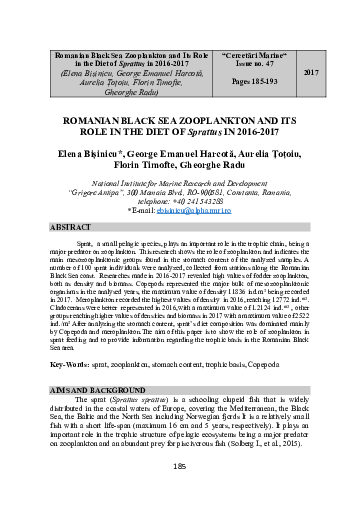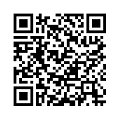Romanian Black Sea Zooplankton and Its Role in the Diet of Sprattus in 2016-2017
DOI:
https://doi.org/10.55268/CM.2017.47.185Keywords:
sprat, zooplankton, stomach content, trophic basis, CopepodaAbstract
Sprat, a small pelagic species, plays an important role in the trophic chain, being a major predator on zooplankton. This research shows the role of zooplankton and indicates the main mesozooplanktonic groups found in the stomach content of the analyzed samples. A number of 100 sprat individuals were analyzed, collected from stations along the Romanian Black Sea coast. Researches made in 2016-2017 revealed high values of fodder zooplankton, both as density and biomass. Copepods represented the major bulk of mesozooplanktonic organisms in the analysed years, the maximum value of density 11836 ind.m3 being recorded in 2017. Meroplankton recorded the highest values of density in 2016, reaching 12772 ind.m3 . Cladocerans were better represented in 2016,with a maximum value of 1.2124 ind.m3 , other groups reaching higher values of densities and biomass in 2017 with a maximum value of 2522 ind./m3 After analyzing the stomach content, sprat’s diet composition was dominated mainly by Copepoda and meroplankton.The aim of this paper is to show the role of zooplankton in sprat feeding and to provide information regarding the trophic basis in the Romanian Black Sea area.
Downloads
Published
2017-12-02
How to Cite
Bișinicu, E., Harcotă, G.-E., Țoțoiu, A., Timofte, F., & Radu, G. (2017). Romanian Black Sea Zooplankton and Its Role
in the Diet of Sprattus in 2016-2017. Cercetări Marine - Recherches Marines, 47(1), 185–193. https://doi.org/10.55268/CM.2017.47.185
Issue
Section
ORIGINAL ARTICLES
License
This is an open access journal, which means that all content is freely available without charge to the user or his/her institution. Users are allowed to read, download, copy, distribute, print, search, or link to the full texts of the articles, or use them for any other lawful purpose, without asking prior permission from the publisher or the author. This is in accordance with the BOAI definition of open access.






